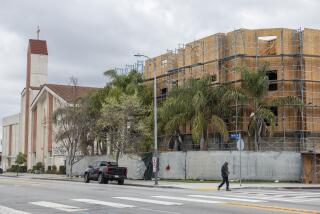A not-so-bright idea
LIKE ENERGY POLICY GENERALLY, Proposition 80 is complex. Its backers say it would end California’s failed experiment with deregulation once and for all, while opponents say that it would needlessly constrain regulators. All voters need to know is that this attempt to make energy policy at the ballot box should be rejected.
At the heart of the ballot measure is a provision that would all but exterminate competition among electricity retailers. Proposition 80 would bar local power companies’ competitors, also known as electricity service providers, from signing up any more customers. Only users that already had long-term “direct access” contracts -- about 12% of the market for power -- could continue to buy from the competitors.
The author of the measure, a San Francisco-based consumer group called the Utility Reform Network, argues correctly that California’s experiment with deregulation has been a disaster. The state’s expanding economy and population have fueled a growing demand for power, yet Sacramento’s muddled energy policy has made it hard for utilities or their competitors to build new power plants to keep pace with that growth.
Still, Proposition 80’s solution is unduly favorable to the utilities. Rather than finding a way to make competition at the retail level work without widening the gap between supply and demand, it just guarantees the utilities a captive market of homes and businesses.
The state already has a temporary ban on new contracts with power generators (as opposed to utilities) that will remain in place for several more years. The Legislature enacted it in response to the energy crisis of 2000-2001, buying time for lawmakers, utilities commissioners and the California Energy Commission to clean up the mess caused by deregulation and to develop a new strategy.
The Public Utilities Commission has taken several important steps, although much remains to be done. Perhaps the biggest move to date was requiring utilities and energy service providers to show in advance that they can meet the anticipated demand for power while still keeping some in reserve.
Proposition 80 simply codifies that requirement, as well as ordering utilities to give top priority to conservation, energy efficiency and renewable sources of power. It also would extend the PUC’s regulatory power to energy service providers and bar homes and small businesses from being charged higher rates at peak hours.
Many of the measure’s provisions would write into law steps the commission has already taken. In doing so, it would bar any changes unless the state Assembly and Senate both agree by a two-thirds vote. There is no good reason for making energy policy so hard to change.
More important, it’s risky business to use the initiative process to write energy policy. Voters should reject Proposition 80.
More to Read
Get the L.A. Times Politics newsletter
Deeply reported insights into legislation, politics and policy from Sacramento, Washington and beyond. In your inbox three times per week.
You may occasionally receive promotional content from the Los Angeles Times.










